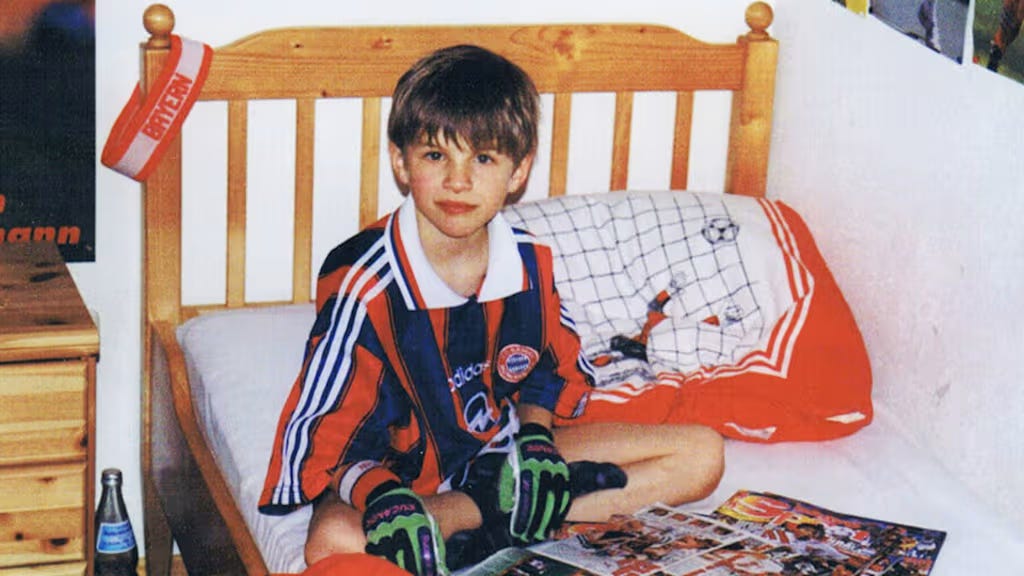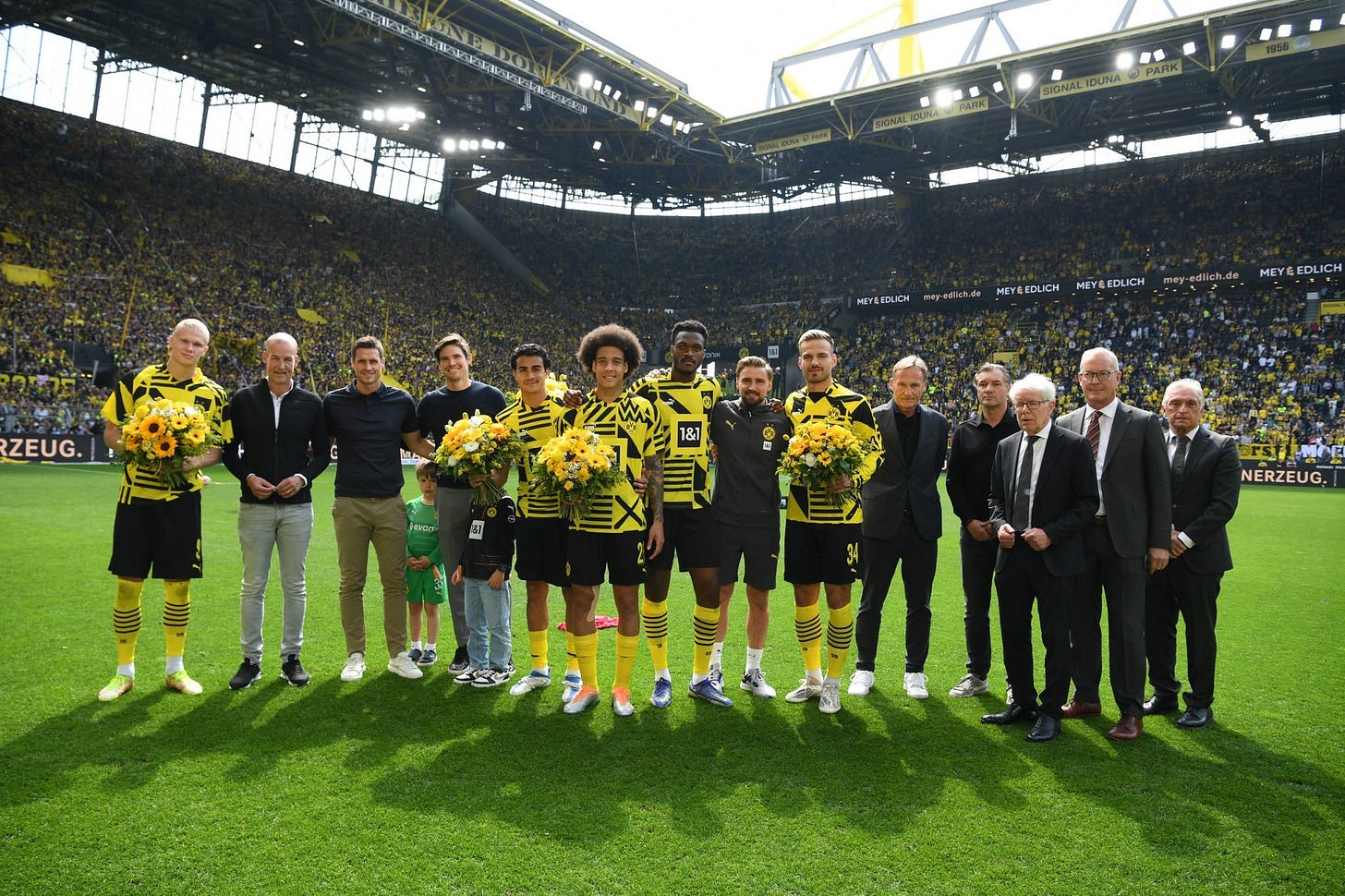Fußball 101: Saying goodbye
Anfield’s treatment of Trent Alexander-Arnold has got tongues wagging; in Germany, things are done very differently
Want more in-depth coverage of German football and its culture?
‘Die 56’ is our new series that will see Bundesletter visit all the grounds in the top three tiers of German football.
Pledgers will receive exclusive writing and podcasts from our travels, while premium backers will also get ground hopping guide.
At the risk of turning this post into an A1 German lesson, here are a few ways you can say ‘goodbye’ to a friend.
‘Tschuss!’: Informal, breezy, frequently used after you’ve completed a transaction at the supermarket. Common.
‘Auf Weidershen!’: Literally meaning ‘until we meet again’, this famous sign-off is too formal to wheel out regularly.
‘Bis später/dann/bald’: The many different flavours of the universal ‘see ya’. I usually pull this one out in my regular späti, or with the friendly cafe owners that know my coffee order off by heart.
This is all to say, there’s no right way to say goodbye. It all depends on context: how long you’ve known the person is important, as is the context and depth of your relationship to the recipient.
Let’s map that idea onto a football transfer. Some players stay forever. When United said goodbye to Gary Neville, Paul Scholes or Ryan Giggs, one men club who at that point had done little to tarnish their reputations with the fans (none of them had been accused of controlling and abusive behaviour or been videoed cutting their grown daughters toenails with their teeth for example; Gary, you’ve got off lightly here) they received a rapturous goodbye from the Old Trafford faithful. The day Scott Parker left Charlton in the winter of 2004, choosing to waste 18 months of his career at Chelsea instead of helping the Addicks push on for Champions League football, I stuck pins in his eyes on my newly minted CAFC calendar. I’m not proud of that goodbye, but you know what, I’d do it all over again if given the chance.
The debate about appropriate farewells has flared up after the treatment of Trent Alexander-Arnold by the Liverpool home fans on Sunday. The 27-year-old started from the bench against Arsenal, presumably to protect him from a negative reaction to his decision to leave his boyhood club.
When Trent’s number was called by Arne Slot, a large percentage of Anfield ‘welcomed’ the player with jeers and boos; as always, it should be noted those catcalls were watered down by a healthy measure of cheers and applause. Queue radio phone-ins, pearl-clutching think-pieces and rancorous social media posts lambasting the Liverpool fans and their supposed rejection of the “You’ll Never Walk Alone” mantra. He’s won everything, they’ll say. He’s given everything he has to the club since he was a six-year-old boy, cry others. Far from me to tell people how to react — I’ve never booed one of my own players and I disagree with it in principle, but I’m not morally outraged by it — but how fans treat their departing stars, especially those that support the club, is complicated. To expect a uniform response in a throng of match goers, let alone the wider fanbase of such a massive club, is foolish. I’d recommend reading Tony Evans’ piece on the matter to see why this specific example reveals many conflicting truths about Liverpool’s attitudes towards its ‘favourite’ sons.
Compare the rancour of Trent’s long goodbye with the beautiful sendoff Thomas Müller received at Bayern. Both men have won every trophy available to them during their time at their respective clubs (Müller many times over), have carved out singular spaces in the football consciousness due to their unique approach to playing their respective positions, and have provided their clubs with a string of iconic moments.
Müller is being shown the door which changes the flavour of the farewell inherently. He’s in the twilight of his career, and Bayern have an obvious heir to Muller’s position in Jamal Musiala. The 35-year-old has never shown any interest in playing outside of Bavaria; the pictures of him in his Bayern-decorated bedroom unsullied by any serious rumours of a move to England or Spain.
Those clips of Müller’s post-game speech and beer shower as he celebrated his record 13th-Bundesliga title were unabashedly joyous. Even the most anti-Bayern fans out there probably got a modicum of warmth out of watching the Ramdeuter bid farewell to the Allianz Arena.
Müller is obviously a special case, but for the most part, German football fans are reluctant to rail against their players for moving on. It’s common for out of contract players, loanees and stars with pre-agreed transfers to receive warm ‘auf weidershen’ before their final home game. Before Union Berlin’s 3-0 loss to Heidenheim on the weekend, Jérôme Rousillon, Kevin Volland, Andrej Ilic and Alexander Scholow were all presented with a red-and-white bouquet as they were given a moment to say goodbye to the Unioner in attendance. Volland was part of the disastrous recruitment class of 2023 and has played just four games for Union in 2024/25; Ilic is returning to Lille from a half-season loan. A pre-season friendly was arranged between Nottingham Forest and Union in the summer of 2022, so the Alte Försterei could give Taiwo Awoniyi a proper send off (get well soon!). Tenure, or success, doesn’t necessarily play a part. Although, it must be said, the day Christopher Trimmel decides to leave Köpenick there will likely be a full-blown viking send-off down the Spree.
I could go back into the depths of X to find the non-plussed reaction of Anglo-centric football fans who questioned Borussia Dortmund’s similar treatment of Erling Haaland before he departed for Manchester. While I can’t accurately report those tweets (I’ve deleted my X account), I vividly remember the terms ‘small-time’, ‘tinpot’, and ‘farmer’ being used to describe the scene; the idea being that BVB were demeaning themselves by celebrating a player that used their club as a stepping stone. I imagine that reaction was built on ignorance; they probably didn’t know how widespread this custom is in Germany, and instead saw an opportunity to dunk on a club that has become viewed as a finishing school for Europe’s elite institutions. Of course, a quick search would have revealed several other of BVB’s players were also given the same treatment alongside the prodigious Norwegian.
The one instance of this ceremony in England that springs to mind is Birmingham City’s decision to retire Jude Bellingham’s number after he left for Dortmund. It was roundly ridiculed. Firstly, for the adoption of an American practice, and secondly, because the midfielder was just 17 at the time. The decision looks prescient now. His transfer pulled the Blues out of immediate financial oblivion, and he will always be the club’s best homegrown product.
German fans are no saints. Mario Götze received dog’s abuse for his move from Dortmund to Bayern, while Rudi Assauer was never forgiven by the black-and-yellow for his post-playing career with Ruhrpott rivals Schalke. But, for the most part, the kurve let their players leave with a pat on the back and a warm ‘bis später’.








Love your work Tom, but you can't compare Trent with Muller. If you want to do that, you only need to look at the how Gerrard or Firmino were feted when the club opted not to give them a new contract.
On the Scott Parker calendar, you were 11 years old ! The Trimmel Viking funeral line is just brilliant. Eisern !